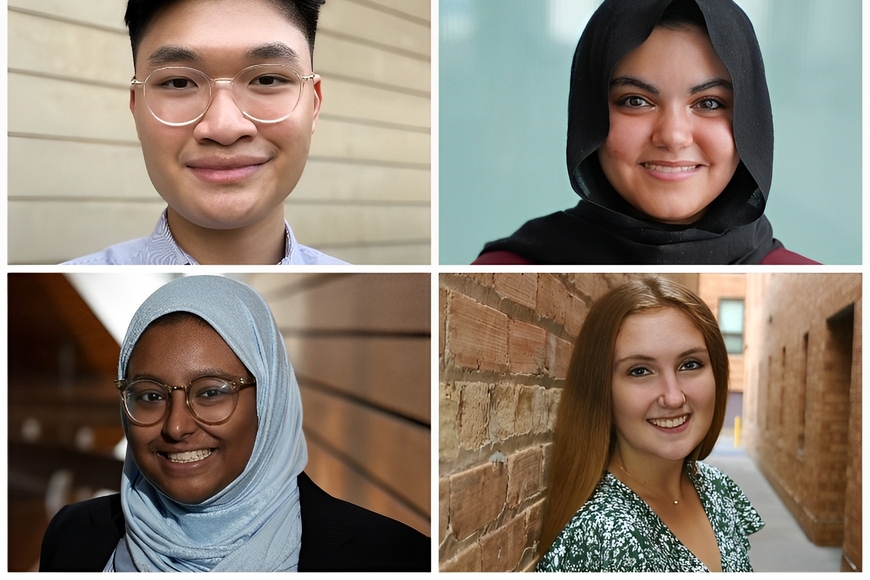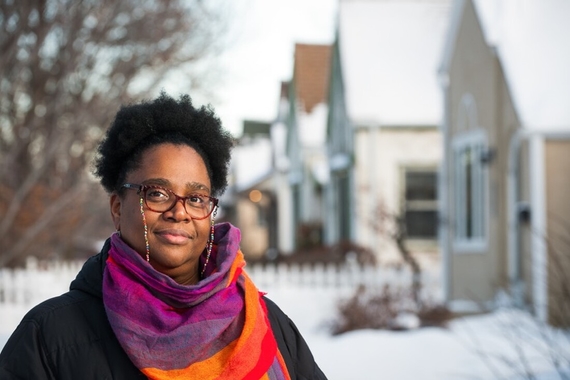The First-Year Writing Program: Four Students Share Their Stories
For many, writing is either a chore or a gift, and depending on the writer, what is written can take on completely different forms. The First-Year Writing Program (FYWP) in the Department of Writing Studies at UMN exists to help students make their writing the best it can be. Every year, over 3,500 students learn a range of writing techniques and processes to help improve their analytical and synthesis skills. Through the First-Year Writing Awards, the work and improvement of students is celebrated as they win merits for their writing.
Thanks to this required program, the lives and futures of many students have been changed for the better. Four students—Carel Tulus, Yamin Mohran, Aubrey Rekstad, and Sumeya Jeilani—were asked to describe the FYWP in one word and speak about how the program has helped them both in and out of the writing field.
Carel Tulus: “Revolutionary”
Going into this program, sophomore architecture major Carel Tulus was among the many other students who were underwhelmed by the requirement. However, as the semester progressed, his opinion began to change. “It opened up my eyes to what writing could be,” Tulus says.
The FYWP gives students a variety of opportunities to try different writing styles and find one that fits their liking. For Tulus, that liking was research writing. In class, he learned to write research papers, analyze sources and data, and weave ideas into conversation. “I realized how much I actually do like writing and research writing…I definitely want to explore doing actual research,” he reflects.
Because of the FYWP, Tulus’ future plans were revolutionized. He submitted his research paper to the FYWA and won the “Writing with Research Winner” category, which bolstered his confidence to pursue research and writing. With this new passion, he will be able to forge new paths to places he never would have discovered without the FYWP.
Yasmin Mohran: “Rewarding”
Writing was always a constant that sophomore nutrition major Yasmin Mohran couldn’t seem to get rid of. Since grade school, she had seen writing as a repeated process that couldn’t be avoided: gather information, sort into paragraphs, revise, finish. When she first saw the FYWP requirement on her schedule, Mohran expected another repeat of her strictly technical high school experience.
But instead, she was pleasantly surprised by the freedom of the FYWP. In class, students are given technical and research writing assignments as well as creative ones. Through a narrative assignment, Mohran was able to break away from the strict format of her previous writing assignments and go back to writing for herself, from nothing more than her own thoughts.
The personalized constructive feedback she received from her professor also made her feel more connected to her work. Through this support and growth, she was able to submit her narrative writing to the First-Year Writing Awards and was selected as a winner, an honor she carries with her accomplishments today.
The FYWP helps rekindle relationships with writing, and for Mohran that is its own reward. Mohran says, “It reminded me why I liked writing in the first place.”
Aubrey Rekstad: “Beneficial”
Aubrey Rekstad, a sophomore architecture major, has always seen writing as a singular process—then the FYWP came along. “It changed my outlook on what writing could be,” she says. Rekstad was able to participate in group discussions to critique her peer's writing in class and, along the way, learned that there is not a one-size-fits-all procedure for writing. “Now I have a few writing intensive courses,” Rekstad says when thinking about the benefits of the class. “It’s just made it a lot easier.”
Now, instead of writing as the system wants her to, when Rekstad is given a writing assignment, she sees an opportunity to choose how to write. For her final project, instead of writing a standard essay, Rekstad opted to present her research and writing as a full website, leaning on her love for design. “It was probably one of my favorite classes I took freshman year,” Rekstad says.
Sumeya Jeilani: “Exploratory”
Sumeya Jeilani has been writing for a while. As a fifth-year technical writing and communications major, she has carried what she has learned in the FYWP into the rest of her college career. “[The FYWP] instilled me with confidence in my writing ability,” Jeilani reflects. She learned how to write in different ways, as well as how to approach researching, organizing texts, constructing arguments, and more.
A few years down the line in her senior year, Jeilani interacted with the FYWP again outside the class. The FYWP is all about exploring ideas and processes, and Sumeya took that to heart by writing a paper campaigning to diversify the teachers of the FYWP. In her paper, she used what she learned in the class to argue for more diverse professors in the program in order to help increase its range of information. “It’s special,” Jeilani says. “It’s the only thing that touches everyone from every college. I like how they run their curriculum now and I think they should take more advantage to fit as a space for representation.”
Shattered Expectations
Sometimes the most unassuming moments end up becoming the most revolutionizing experiences. These four students were able to explore all of the unique aspects of writing and reap the benefits of what they learned. Whether that be a new interest, a rediscovered one, a valuable skill or an increased confidence in an old one, the FYWP has rewarded each student it has taught. The FYWP is an expansive, in-depth course that teaches students not just how to write but how to analyze, create, and (re)discover passions—a process that sets them up for success.
Writing for the World
Read more about the First-Year Writing Program and how it prepares students for a life of purposeful writing.



